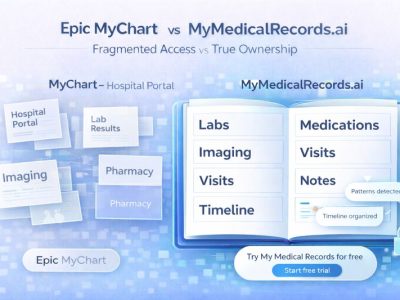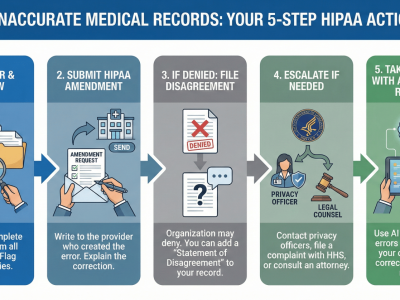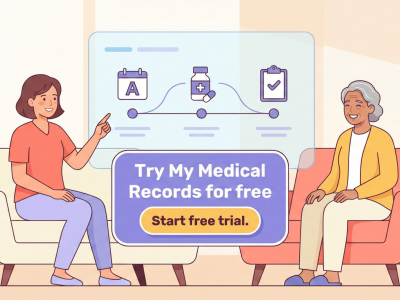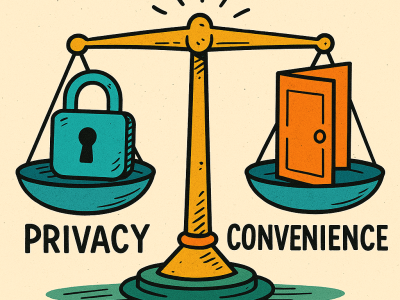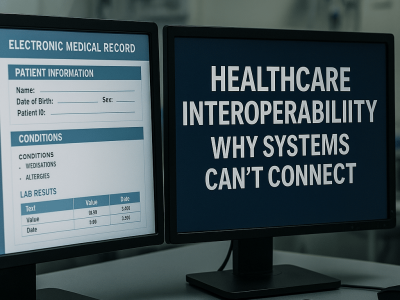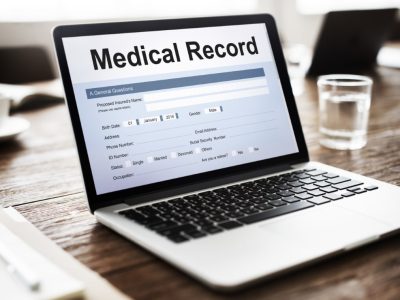Your medical record number (MRN) is a unique identifier that links you to all your medical information across healthcare providers. Knowing how to locate it is essential for accessing your records, understanding your health history, and navigating insurance or legal documentation with ease.
KEY TAKEAWAYS
- Your medical record number (MRN) is unique to you and specific to the healthcare provider that assigned it.
- MRNs are vital for organizing, tracking, and retrieving your personal health information.
- You can usually find your MRN on hospital ID cards, discharge paperwork, or patient portals.
- MRNs help healthcare providers avoid mix-ups and maintain accurate, secure patient records.
- Knowing your MRN can make insurance and legal claims much smoother to handle.
Table of Contents
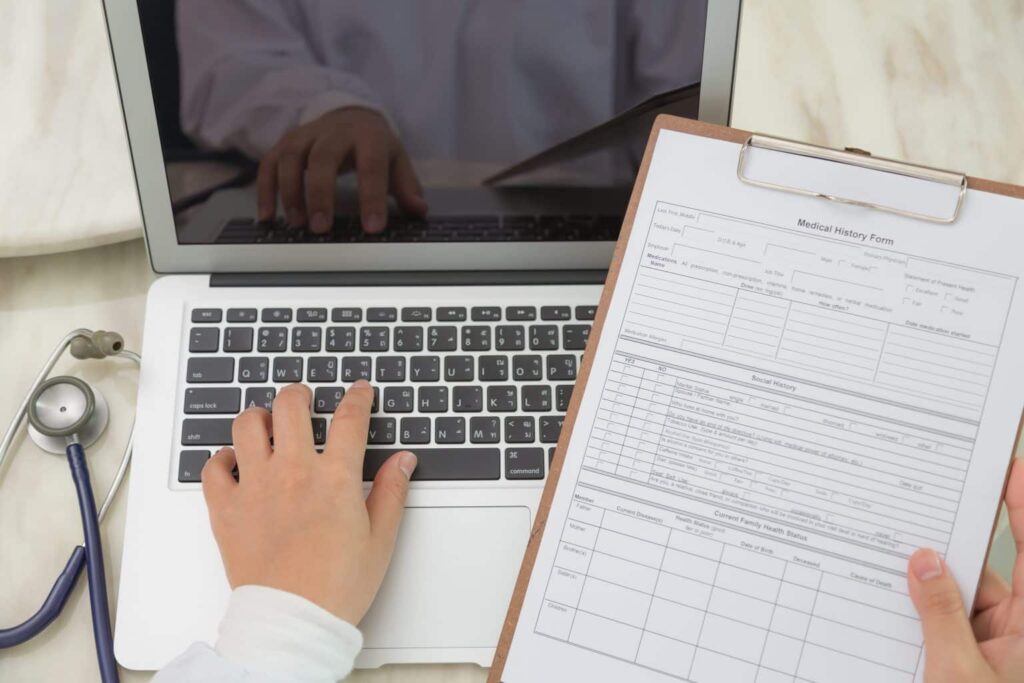
Every time you visit a hospital or clinic, your health information is logged, stored, and updated in a system. That system uses a unique identifier known as a medical record number (MRN) to track your data. It acts as a digital fingerprint within a healthcare provider’s system and is a vital part of managing your health records securely.
Understanding what an MRN is—and more importantly, how to find it—can help you better manage your personal healthcare journey. Whether you’re accessing records for yourself, a loved one, or submitting paperwork for legal or insurance needs, your MRN plays a key role.
What Is a Medical Record Number?
A medical record number is a unique alphanumeric code assigned to you by a hospital, clinic, or other healthcare institution. It is used to identify and retrieve your medical records within that specific system. Unlike your social security number, which is universal, your MRN is organization-specific. That means each hospital you visit may assign a different MRN to you.
The MRN ensures that your health data—from lab results to medication history—is organized under one ID in a specific facility. This improves efficiency, reduces errors, and keeps your medical information private and secure. Without this system, sorting through thousands of patients would be chaotic and time-consuming for healthcare workers.
Additionally, MRNs reduce the risk of misidentification. When patients share similar names or birthdates, the MRN is what makes your chart distinct. It’s a cornerstone of healthcare documentation and critical for everything from billing to prescriptions.

Where Can You Find Your Medical Record Number?
If you’ve ever wondered, “How do I find my medical record number?”—you’re not alone. MRNs aren’t always front and center, but they’re almost always listed on official documents and portals provided by your healthcare provider.
You can typically locate your MRN in several places:
On your hospital or clinic ID wristband during a hospital stay.
On your discharge summary, lab reports, or after-visit summaries.
Through your patient portal or health management app linked to your provider.
On billing statements or insurance documents provided by the hospital.
Some facilities may even print the MRN on a patient ID card or appointment confirmation letter. If you’re unsure, simply call the medical records department of the facility you visited. They’ll guide you on how to retrieve it securely.
Knowing your MRN is especially useful when managing insurance claims, sharing records with specialists, or handling legal medical documentation. At My Medical Records, we recommend storing this number safely as part of your personal health profile.

Why Is the Medical Record Number Important?
The importance of your medical record number goes beyond just finding lab results. It is the key that unlocks your entire healthcare timeline within a particular facility. When you provide this number, you help healthcare professionals locate your full history instantly—improving your care and reducing potential errors.
For instance, if you’re being transferred from a primary care physician to a specialist, providing your MRN allows for faster, more accurate data sharing. It saves time and ensures the specialist sees the full picture of your health.
Moreover, the MRN becomes essential when dealing with legal claims, disability applications, or insurance coverage verification. A missing MRN can delay the process. Platforms like My Medical Records ensure that your MRNs and documents are securely stored and easy to access when needed most.
Can Medical Record Numbers Be Shared Across Providers?
A common misconception is that your MRN follows you wherever you go—but that’s not the case. Each hospital or clinic typically generates its own MRN. So if you visit multiple health systems, you’ll likely have multiple MRNs.
However, healthcare providers can still communicate using your other identifiers—like your name, date of birth, or insurance info. Many advanced systems are now linked via Health Information Exchanges (HIEs) or state-wide networks, allowing easier transfer of your records, even if the MRN changes.
Still, you should always keep a record of your different MRNs, especially if you visit different providers often. Services like My Medical Records help consolidate your MRNs, documents, and history from various systems in one place, helping you stay organized no matter how many providers you’ve seen.

What If I Lost or Can’t Find My MRN?
If you can’t find your medical record number, don’t panic. Healthcare facilities have protocols in place to verify your identity and help you retrieve it safely.
Start by logging into your provider’s online patient portal. If you’re registered, the MRN is often visible in your account dashboard or under the profile settings. If not, you can contact the medical records department directly—just be ready to verify your identity with personal information.
At My Medical Records, we recommend keeping digital backups of all important healthcare documents, including your MRNs. We use secure, AI-powered solutions to make storing, searching, and sharing your documents effortless—no more lost files or guessing where your records are.

Why Store Your MRN With My Medical Records?
In today’s fast-paced healthcare environment, quick and secure access to your medical history is more important than ever. That’s where My Medical Records comes in. As an AI-powered platform for insurance and legal medical records, we help individuals and families keep their information organized, confidential, and accessible.
Our platform ensures your MRNs, medical records, insurance documents, and more are stored securely in one place—accessible anytime you need them. Whether you’re switching doctors, applying for disability benefits, or submitting legal documentation, your MRNs and associated files will always be just a few clicks away.
You can contact us here to learn how we can help streamline your medical documentation today.
Helpful Tips for Finding and Saving Your Medical Record Number
Whenever you visit a new provider, ask for your MRN during check-in or in the discharge paperwork. Then upload and store it digitally in a secure place, such as My Medical Records, so you’ll never lose it again.
Summary:
Your medical record number is a simple yet vital part of managing your healthcare information. Whether you’re accessing your records, dealing with insurance, or navigating legal requirements, having your MRNs stored and accessible can save time and prevent unnecessary complications. My Medical Records is your trusted AI-powered partner for organizing and securing all your essential health data across providers.
Related Topics:
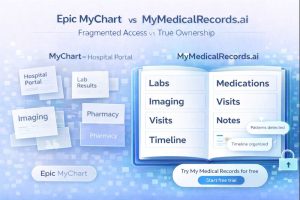
Epic MyChart vs. MyMedicalRecords.ai: Portal Access vs. True Ownership
Epic MyChart vs. MyMedicalRecords.ai: Portal Access vs. True Ownership Meta description: Epic MyChart only shows records from one hospital system. MyMedicalRecords.ai aggregates 100% of your
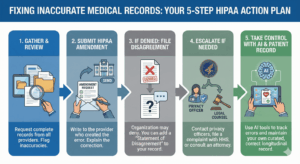
What to Do If There Is Inaccurate Data in Your Medical Record
The chart that does not match you You probably discovered the inaccurate medical records error because something routine went wrong: a prior authorization denied, a
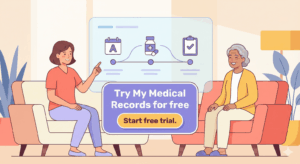
From Chaos to Clarity: A Family Caregiver’s Guide to Unified Health Records
Here’s what nobody tells you about caregiving: The hardest part isn’t watching your loved one struggle with their diagnosis. It’s trying to keep track of
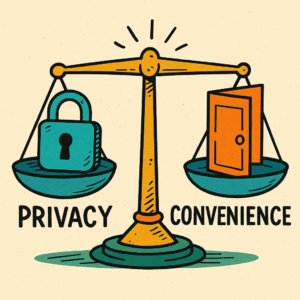
Privacy vs Access: Finding the Right Balance in Your Digital Health Record
Healthcare interoperability is the ability of different healthcare systems, devices, and applications to seamlessly share, understand, and use patient data across organizations and geographic boundaries.
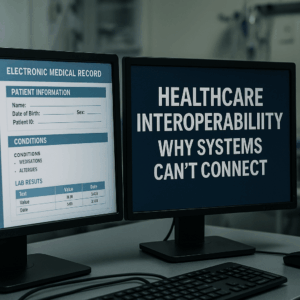
Healthcare Interoperability: Why Systems Can’t Connect
Healthcare interoperability is the ability of different healthcare systems, devices, and applications to seamlessly share, understand, and use patient data across organizations and geographic boundaries.

How to Merge Medical Records from Multiple Doctors and Avoid Errors & Duplicates
Learn how to merge medical records from multiple doctors, avoid duplicate entries, and reduce errors. Use AI tools like My Medical Records to simplify the process.

